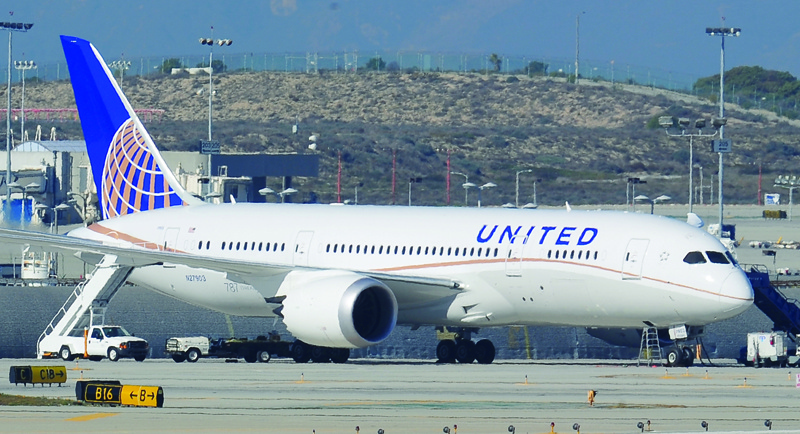 LOS ANGELES: In this file photo a grounded United Boeing 787 Dreamliner is seen on the tarmac at Los Angeles International Airport. - AFP
LOS ANGELES: In this file photo a grounded United Boeing 787 Dreamliner is seen on the tarmac at Los Angeles International Airport. - AFPLOS ANGELES: Boeing will temporarily reduce production of the 787 Dreamliner plane after identifying a new issue with the jet during inspections, the company announced yesterday. Boeing is "reprioritizing production resources for a few weeks" after it "identified additional rework that will be required on undelivered 787s," the company said, without providing further details. The aviation giant has been working with regulators at the Federal Aviation Administration (FAA) on a system of 787 inspections after earlier production problems on the plane.
The FAA described the problem as a "manufacturing quality issue near the nose on certain 787 Dreamliners in the company's inventory of undelivered airplanes," an agency spokeswoman said. "Although the issue poses no immediate threat to flight safety, Boeing has committed to fix these airplanes before resuming deliveries. Based on data, the FAA will determine whether similar modifications should be made on 787s already in commercial service."
The latest 787 problem adds to the headwinds facing Boeing even as the travel industry begins to rebound from a deep downturn caused by COVID-19, and commercial airlines announce significant new plane orders. A Boeing spokesman said new 787 deliveries remain halted as the company negotiates with the FAA on an inspection protocol for the jet's fuselages.
The announcement means Boeing's 787 output "will temporarily be lower than five per-month and will gradually return to that rate," the company said. "Boeing now expects to deliver fewer than half of the 787s currently in inventory this year." Boeing has previously said it has about 100 787 planes in inventory. The disclosure about came as Boeing reported 79 second-quarter commercial plane deliveries, up from 70 in the year-ago period.
The figures include a big jump in 737 MAX deliveries after the FAA cleared the jet to resume service in November 2020 following a 20-month grounding due to two deadly crashes. Boeing's shares fell 1.9 percent in pre-market trading to $233.85. Meanwhile, the European Commission will propose a raft of measures to slash EU aviation emissions when it unveils a bumper package of legislation aimed at reaching its climate goals.
But the push, including an unprecedented tax on highly polluting jet fuel, is facing strong headwinds from airlines in the bloc, who fear they will have their wings clipped. Brussels argues that a new levy on kerosene for flights inside the EU is a must if the 27-nation bloc is serious about reaching its ambitious target of cutting greenhouse gas emissions by 55 percent compared with 1990 levels by 2030. The aviation sector-which makes up about three percent of current EU emissions-insists the tax would make it unable to compete with rivals from outside the bloc.
And the proposal is set to be one of the thorniest issues when European lawmakers, EU member states, lobbyists and green activists start what is expected to be months of furious haggling to shape the final laws. The proposed legislation, seen by AFP, lays out the strategy envisioned by the EU executive. The tax-to be introduced gradually over a decade-would be based on how energy efficient and environmentally friendly different types of kerosene are.
The aim is to convince carriers to switch to more "sustainable" mixes that contain some biofuels. These would not be taxed. Due to international legal constraints, private jets and cargo planes would remain exempt from the new levy. The commission also plans to issue a separate directive aimed at boosting the-still very modest-use of "sustainable fuels".
Cheap fuel havens?
Some member states have already come out in favor of the plan. Belgium, Luxembourg and Austria wrote an open letter calling for a kerosene tax to be applied "without delay" in the EU-and pushing for the same measure to be adopted internationally. Meanwhile, the EU's airline sector has hit back with its own concerns.
A group of eleven major companies including Air France-KLM and Lufthansa warned that the moves would "significantly increase the competitive advantage of non-EU airlines and non-EU hub airports compared to their EU counterparts". The carriers, struggling to overcome the huge hit to business from the coronavirus pandemic, cautioned the plan could spur so-called "carbon leakage"-including seeing airliners fill up in countries on the EU's fringes like Turkey or Britain to avoid the charge. - AFP










